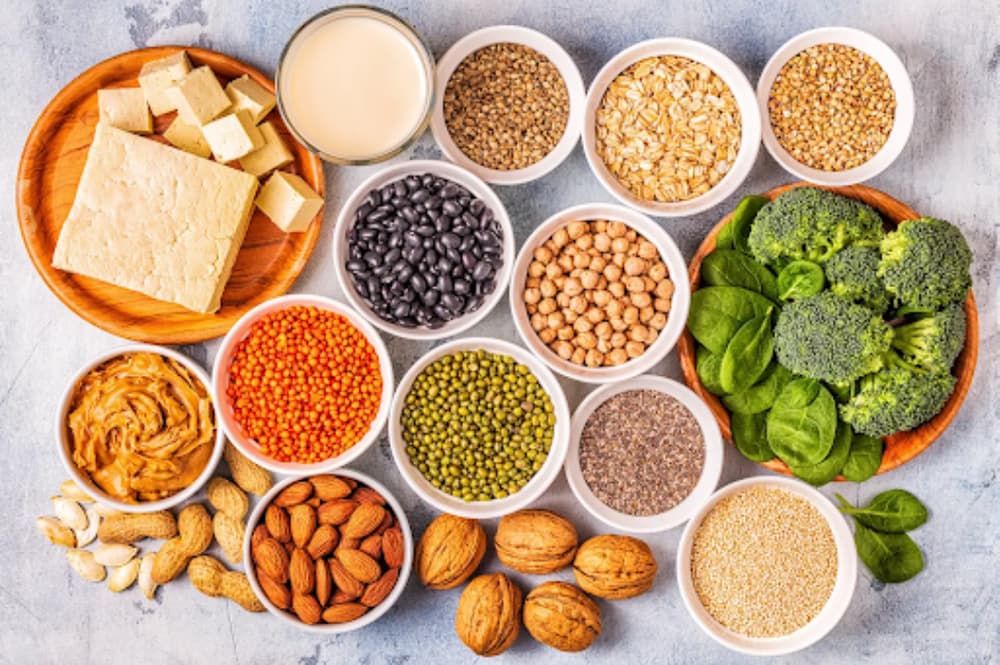Plant-based proteins are transforming sports nutrition by offering effective support for muscle growth and recovery. Rich in essential amino acids, antioxidants, and nutrients, these proteins promote faster healing, better digestion, and sustainable fitness.
The Power of Plant-Based Protein for Athletes: Fueling Muscle Gain and Recovery Naturally
Written by Kashish Rajput

The world of sports nutrition is rapidly evolving, with more and more athletes shifting towards a plant-based diet so that they can reap the best from their performance, muscle development, as well as recovery. What were once considered to be poor sources of protein from plants are now celebrated for their far-reaching benefits.
This article explores how plant proteins have become a strength for sportspeople and how they support muscle gain and recovery naturally.
Why Protein is Important for Athletes
Protein is anabolic nutrient involved in repairing muscles, building muscles, and body function overall. When exercising, especially with strength training or long-duration sports, the muscle fibers are microscopic in damage.
Adequate protein consumption provides the body with the amino acids required to heal the damage and develop stronger muscles. Protein also plays a role in the production of enzymes, hormones, and immune function, all of which are needed for athletic performance.
Long ago, animal proteins such as whey, casein, egg, and meat have been used owing to their perfect amino acid composition and good bioavailability. But with the continuous advancement of nutrition science and processing technology of plant proteins, plant protein has also been found to be equally effective if consumed under proper conditions.
Why is Plant-Based Protein Unique?
Plant-based proteins are obtained from heterogeneous natural materials like legumes, cereals, seeds, nuts, and vegetables. Some examples are:
- Pea Protein: High in branched-chain amino acids (BCAAs) that are crucial for muscle repair.
- Brown Rice Protein: Hypoallergenic and easily digested.
- Hemp Protein: High in omega-3 fatty acids combined with protein.
- Quinoa: Whole protein with all nine amino acids.
- Lentils and Beans: High in fiber and micronutrients.
Even though others are missing one or more of the essential amino acids (and thus "incomplete"), mixing various plant foods in your diet can yield a complete amino acid profile, which supports muscle protein synthesis very well.
The General Advantages of Plant Protein for Sportspersons
- Improved Nutrient Profile: Plant proteins are fortified with vitamins, minerals, fiber, and antioxidants compared to isolated animal proteins. Antioxidants fight oxidative stress in the form of excessive exercise, preventing inflammation and enabling quick recovery.
- Easy on the Digestive System: Most athletes find that dairy proteins such as whey or casein cause digestive upset and create bloating or intolerance. Plant protein, particularly pea and rice protein, is kinder on the digestive system and will not be as likely to cause gastrointestinal upset.
- Sustainable and Ethical: Environmental sustainability is increasingly a topic of interest. Plant protein requires less and has a lower carbon emissions profile compared to animal agriculture, so they're the intelligent choice for environmentally conscious athletes.
- Supports Heart and Metabolic Health: Plant protein generally contains less saturated fat and no cholesterol. This nutritional content is good for heart health, which is needed for endurance and overall longevity as an athlete.
How Plant-Based Protein Supports Muscle Gain and Recovery
Muscle growth is initiated mainly by muscle protein synthesis (MPS), a process induced by the presence of essential amino acids, particularly leucine, one of the crucial branched-chain amino acids. Studies have revealed that some plant proteins, mainly pea protein, have leucine contents that are as good as whey protein, which is highly effective in inducing MPS.
Post-Workout Recovery
Following training, muscles need nutrients to repair and grow. Taking a plant-based meal or protein shake within 30-60 minutes of exercise can maximize recovery by:
- Refilling glycogen stores (when paired with carbohydrates)
- Delivering vital amino acids to repair muscles
- Eliminating muscle soreness through antioxidant effects
- Long-Term Muscle Growth
Consumption of adequate protein daily from various plant foods may help in achieving slow and sustained muscle gain. With strength training, plant proteins have been shown to improve lean body mass significantly.
Practical Tips for Plant Protein for Sports Persons
- Food Mixing and Matching: Mix legumes (lentils, beans) with grains (rice, quinoa) or nuts and seeds such that all the amino acids are ingested.
- Select Fortified Protein Powders: A number of plant protein powders are fortified with BCAAs, vitamin B12, iron, and other nutrients typically deficient in a vegan diet.
- Timing is Important: Schedule protein consumption after exercise and distribute protein consumption throughout the day to optimize MPS.
- Ensure Balanced Nutrition: Consume protein with healthy fat, complex carbohydrates, and hydration for overall sports performance.
- Listen to Your Body: Vary amounts and protein sources according to your energy requirements and digestion.
Real-World Examples and Athlete Testimonials
Many top-level athletes in sports such as ultramarathon running, bodybuilding and the Olympics promote a plant-based diet. They report better recovery time, better energy, and better quality of life as a whole. Stories of plant-based athletes like ultramarathoner Scott Jurek and tennis player Venus Williams have opened people's eyes to reconsidering the part of their diet that provides protein.
Final thoughts: Join the plant-based revolution!
The myth that obtaining a plant-based protein diet will not facilitate serious muscle gain, recovery and performance, has been unmasked by actual results, and science. A plant-based diet can serve as complete, dense, and nutrient rich protein resources to fuel performance, protect health and maintain an environmentally-sensitive diet.
If you are an athlete who routinely consumes a strictly vegan diet, or if you are just trying to reduce some animal products from your diet, incorporating more plant proteins is worth a shot. Plant proteins can fuel exercise training, speed recovery and enhance the overall fitness experience.